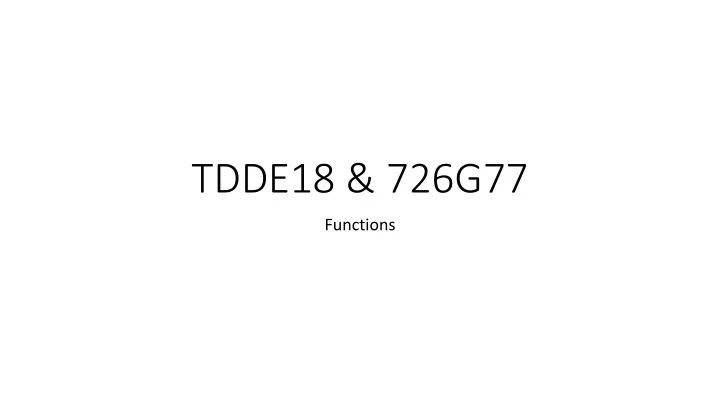

TDDE18 & 726G77 Functions
Labs update • No more one time password. We will note who have demonstrated during the lab and register this in webreg. • Use the terminal to send in your lab! Dont use Visual studio code!
Tooltip of the week – Preferences & Auto save
Variable Value Type
Variable • Fundamental (also called built-in types) • Stores a value of a fundamental type, nothing more • Object • Stores values tied to an derived type (struct, class) • Operations associated to the type are provided • More about classes later in the course • Pointer • Stores the address of some other variable • More about pointers in the course
Struct – Compound data type Other boxes – zero or more Type • With struct it is possible to combine variables into one derived type
Constants Unchangeable Value Type • A variable can be declared const • Modification of a const variable will give compilation error.
Reference Value Type • Alias to another already existing variable • A reference cannot refer to another variable after definition
Const& Unchangeable Value Type • The value could be change using the original variable and not the reference
Sequence and block { // Beginning of the block statement 1; statement 2; statement 3; } // End of the block Any variable declared inside a block is only visible inside that block
Function • A block that has been given a name • Can be executed (called) by writing it’s name in other parts of the program return-type function-name(parameter-list) { statement1; statement2; return expression; }
Function types • Global functions – Visible everywhere in you program after you declaration • Member functions – A function that is a part of an object variable • Lambda functions – A function created inline, or “on the fly” • Function objects – An object possible to call as a function
Global function • Also called a subroutine or procedure if there are no return value. • Visible after declaration ... // Call foo here is a compilation error void foo(); ... // Ok to call foo
Function declaration and definition • Declaration • Tells the compiler the function exists somewhere void foo(); • Definition • Places function code in program void foo() { } • Give the programmer a way to separate the program
Function result return-type function-name(parameter-list) { statement1; statement2; return expression; } • return-type could be of any type that is declared in your program • return expression must be of the return-type • return statement exits the function
Function input parameters return-type function-name( parameter-list ) { statement1; statement2; return expression; } Zero or more specified in parameter list Beware of automatic conversion if the compiler know a way to convert
Function - Best practice • Always use const in case fundamental types • Always use const& in case object types. • Remove const only if you must
Function overload • Different functions can have the same name • Functions with same name must have different parameters • Arguments given determine which function is actually called (closest match • Compiler will select the “best match” among functions with the same name • Return value is not considered even if different
Overloading example int triangle_area(int base, int height); int triangle_area(int side1, int side2, int side3); int triangle_area(int side1, int side2, float angle); int triangle_area(int side, float angle1, float angle2); triangle_area(1, 1); triangle_area(1, 1, 1); triangle_area(1, 1, 1.0); // which is called? triangle_area(1, 1.0, 1.0); triangle_area(1, 1, 1.0f); triangle_area(1, 1.0f, 1.0f);
Default values • Parameters can be given default values • Specified in declaration only, since definition may be unknown to compiler if program is in several files • Default values can only be specified for last non-default parameter • Can be omitted when calling the function
Default values • Parameters can be given default values • Specified in declaration only, since definition may be unknown to compiler if program is in several files • Default values can only be specified for last non-default parameter • Can be omitted when calling the function • Combined with function overload then the declaration must be unambiguous!
Recursion • A function can call itself. Helpful to solve complex problem where the solution space is exponential • N-factorial example int factorial(int n) { // 5 4 3 2 1 if (n == 1) return 1; return n * factorial(n – 1); }
File seperation • Related functions can be gathered in one file to form a package. • A package can be compiled separately, and do not need recompilation unless you change a package source file. • Public declarations are place in a header file .h • Definitions are placed in a implementation file .cc/.cpp • Header and implementation files should have the same name, except for the extension
Header guard • Header file must have a preprocessor guard to protect from multiple inclusion #ifndef _FILE_NAME_H_ #define _FILE_NAME_H_ // public declarations #endif
Compiling multiple files • Never compile a header file. This will give you a cached version of that header file. This file have the file extension .gch. Remove this if you have it!
Lesson 2 • English in T11 – C building
Recommend
More recommend